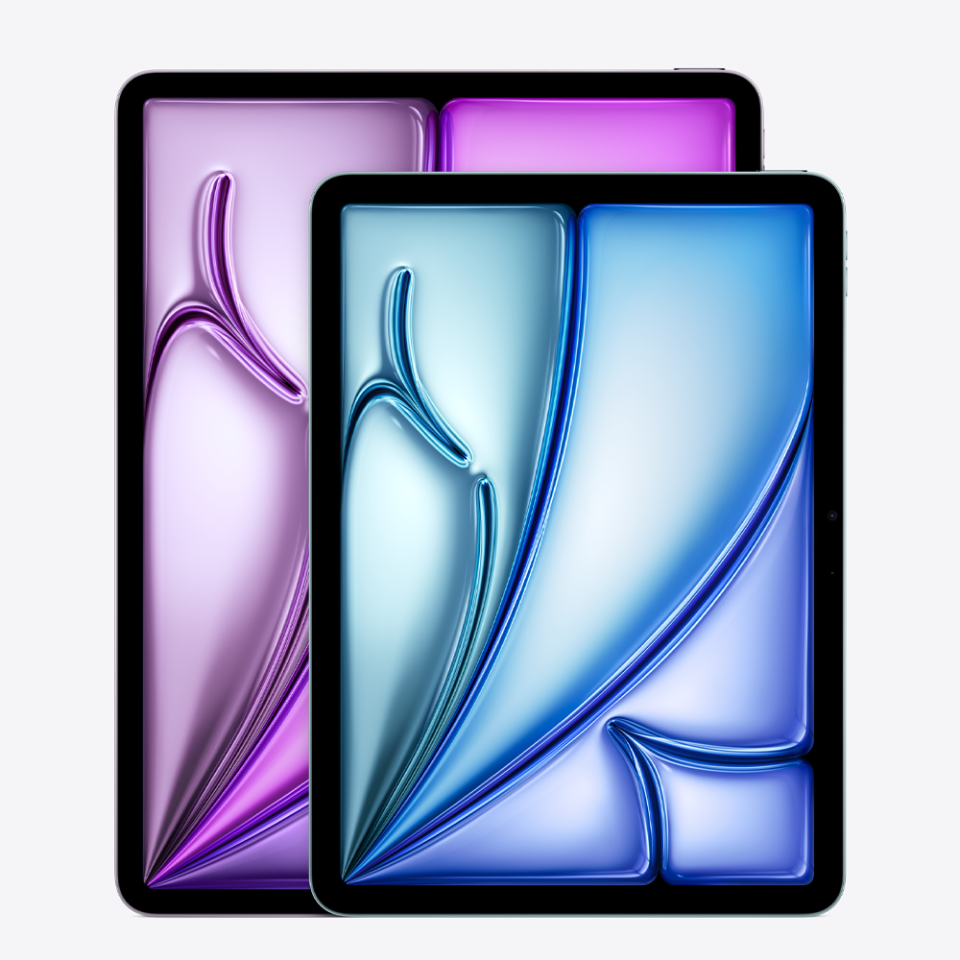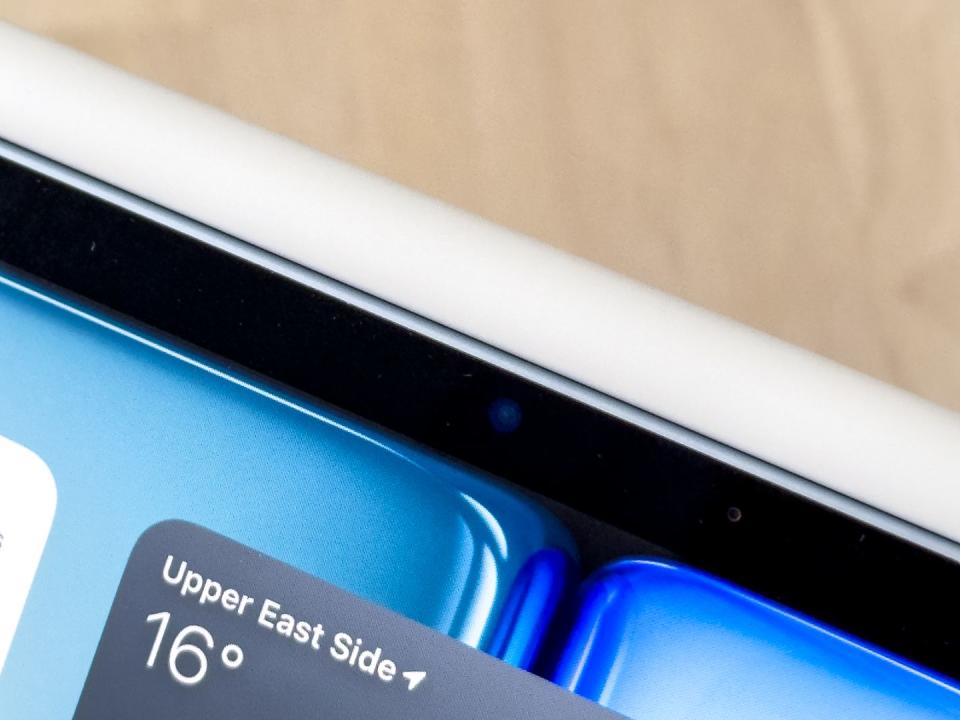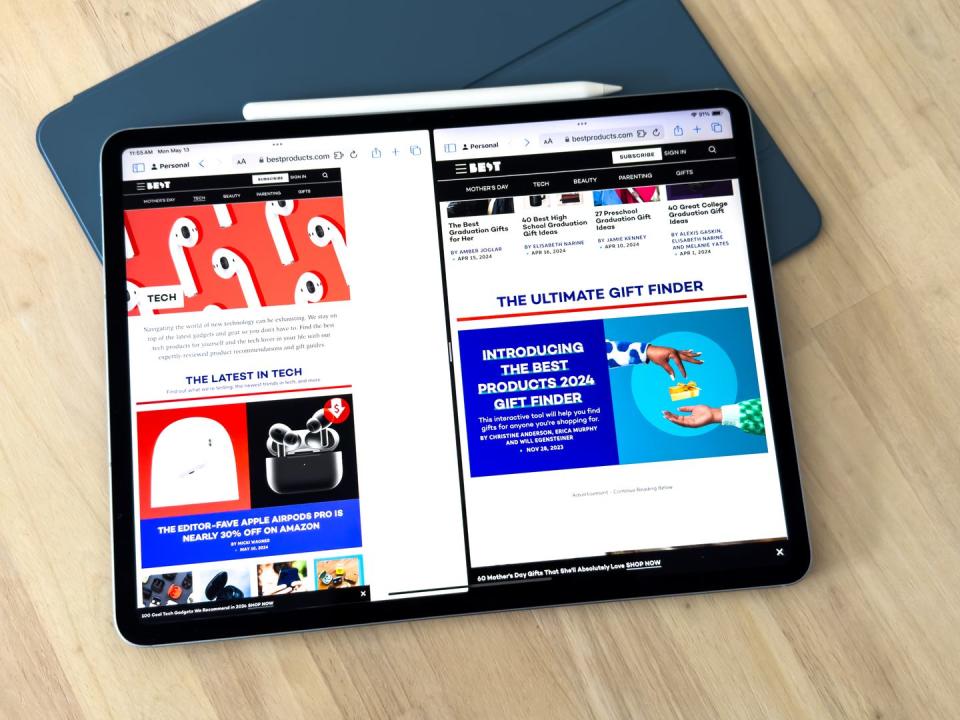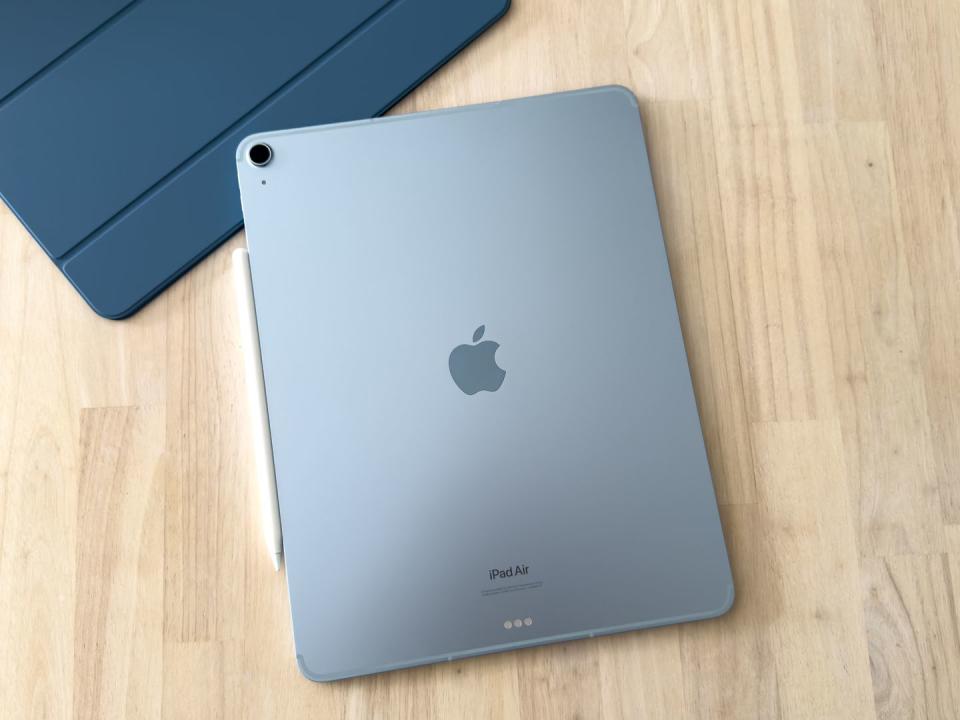“Hearst Magazines and Yahoo may earn commission or revenue on some items through these links.”
We knew something big was coming from Apple’s announcement, and it turned out to be “big” in the literal sense. The new Apple sixth-generation iPad Air is the first to be available in two display sizes — 11- and 13-inch. The slate debuted alongside the stunningly thin iPad Pro at an event in early May. It has the same $599 starting price as its predecessor.
In addition to a larger screen option and the mandatory chip swap, the new iPad Air brings a number of additional design and hardware tweaks, like a new front camera layout, more memory, and support for the all-new Apple Pencil Pro. Like the recently refreshed MacBook Air, the iPad with the same moniker is defined by mostly invisible but impactful upgrades.
The fifth-generation iPad Air has been a top tablet pick of ours since its 2022 launch, so I was pumped to discover how the sequel stacks up, especially in 13-inch guise. After a week of putting it through its paces, I can confirm that the new iPad Air is still the best product in its price category. I can assure you that as a personal device, or as a gift to a student or recent grad, this is a great pick.
iPad Air 13-inch (M2)
amazon.com
$764.00
How We Tested
I tested the iPad Air with a 13-inch Liquid Retina display, a Magic Keyboard, and the Apple Pencil Pro for almost a week. I used the slate instead of a laptop to crank out work, as well as to browse the web and social media, reading, streaming content, and gaming with an external controller.
About the Bigger Screen
The 13-inch Liquid Retina display option is hands down (and literally) the biggest hardware upgrade of the iPad Air. Having more screen real estate allowed me to effortlessly run two apps side by side, vastly improving my workflow on the move in the process. The bigger screen also came in handy when I needed to watch a Knicks playoff game while the big-screen TV at home was occupied.


By making the slate vastly more proficient at multitasking, Apple Pencil interactions, streaming content, and gaming with a wireless controller, to name a few activities, the 13-inch screen helps make an even stronger case for choosing the iPad Air over a traditional laptop.
In addition to providing more possibilities across the board, the 13-inch screen of the iPad Air is also 20% brighter than the display panel of the 11-inch version. The brightness increase will make a difference if you or the gift recipient use the device in spaces with bright ambient lighting.
Familiar Design
Big screen option aside, the new iPad Air looks like the previous generation. The 11-inch version has the same design and footprint, though it’s not completely identical. Both versions of the new Air have a new landscape front-facing camera location in its landscape bezel, as opposed to the top portrait one, which was also home to the power button in all prior releases dating back to the original.


The newly located front-facing camera was a game changer while using the 13-inch iPad Air instead of my laptop with the Magic Keyboard attached. The Touch ID sensor integrated into the power button made the slate easy to unlock in both landscape and portrait mode, as usual.
Best-in-Class Performance
By fitting it with the M2 chip, Apple put the new iPad Air in the same performance echelon as the entry-level MacBook Air and the previous-generation iPad Pro. The silicon has a proven track record of excellence, and it brings significant bumps in processor, graphics, and Neural Engine performance over the M1 chip that powers the fifth-generation iPad Air.
The real-life speed and performance of the 13-inch slate are fantastic, leaving similarly priced rivals in the dust. The big iPad Air performed well as my laptop replacement over a few busy days. It made quick work of my multi-app routine, which consists of constantly toggling between a web browser with 10+ open tabs, Microsoft Outlook, Slack, Affinity Photo 2, Apple Pages, and Apple Music, among other apps.


I had no trouble getting through a workday between power-ups while testing the 13-inch iPad Air. Using it for more casual tasks like web browsing, streaming video, or reading is almost certain to get you or the giftee more use, so long as you don’t max out the screen brightness.
Other Noteworthy Upgrades
The new iPad Air is compatible with the Apple Pencil Pro, just like the thinner and pricier iPad Pro. Featuring haptic feedback, a customizable squeeze gesture, and an all-new barrel roll input, the optional accessory is more capable and futureproof than the second-generation Apple Pencil. The Air is also compatible with the under-$80 Apple Pencil with USB-C.
The new Apple Pencil Pro features mentioned above are helpful while taking notes and sketching in Freeform. I wish the slate were compatible with the iPad Pro-exclusive, metal-clad Magic Keyboard for its extra row of keys and haptic trackpad. Still, the $299 standard version of the accessory didn’t leave me wanting in ergonomics and tactility.


Up-to-date Bluetooth 5.3 and Wi-Fi 6E are welcome connectivity upgrades in the latest iPad Air. The 13-inch version I tested also pumps out a more powerful sound with punchier bass than the 11-inch variant. The sonic experience complemented the bigger screen perfectly during my testing.
I tip my hat to Apple for offering the iPad Air with four memory options, ranging from 128 GB to 1 TB. Best of all, the entry-level version now has double the storage compared to only 64 GB in the outgoing model.
Conclusion
Similarly to the MacBook Air, the iPad Air is the best product in its category for most consumers, offering an unbeatable amalgam of sleek, instantly recognizable design and class-leading performance at an agreeable price. This is the full-size tablet to get unless you can fit an iPad Pro into your budget.
I’d pick the 13-inch version over the smaller and cheaper 11-inch Air because it can replace a standard laptop without requiring a compromise in screen size. The big-screen slate is also perfect for students, particularly in tandem with the Magic Keyboard and an Apple Pencil.
The 11-inch iPad Air with 128 GB of storage starts at $599, while the 13-inch version is an extra $200. Adding 5G connectivity is $150 more for any storage version.
Doubling the memory is only $100 more, so I wouldn’t hesitate to recommend it. However, if you are contemplating going for 512 GB or 1 TB storage options, keep in mind that the money you spend will be in iPad Pro territory.
You Might Also Like
Source Agencies


